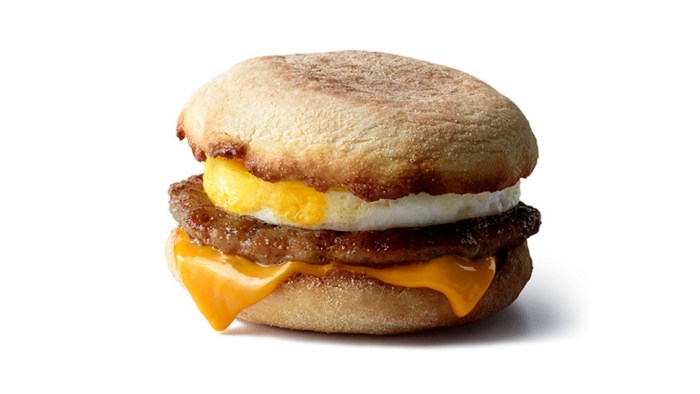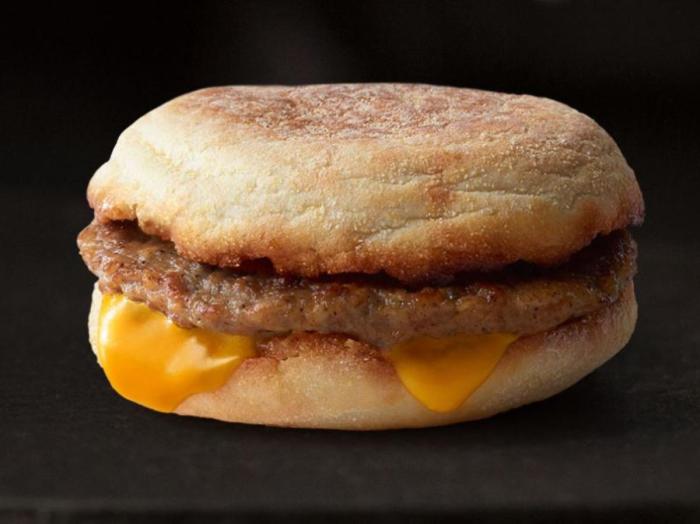Nutritional Content Breakdown
Sausage mcmuffin nutrition facts – Understanding the nutritional composition of a Sausage McMuffin is crucial for making informed dietary choices. This breakdown provides a detailed analysis of its macronutrients and micronutrients, offering insights into its contribution to a daily nutritional intake. We will examine the calories, fats, proteins, and carbohydrates, as well as key vitamins and minerals, alongside their respective percentage daily values.
Macronutrient Composition
The Sausage McMuffin’s macronutrient profile significantly impacts its overall caloric value and its effect on energy levels and satiety. A typical Sausage McMuffin contains a considerable amount of fat, contributing significantly to its calorie count. The protein content, primarily sourced from the sausage patty, provides essential amino acids for muscle building and repair. Carbohydrates, largely from the English muffin, offer a readily available energy source.
However, it’s important to note that the majority of carbohydrates are refined, lacking significant fiber content.
Micronutrient Content
While primarily a source of macronutrients, a Sausage McMuffin does offer small amounts of several micronutrients. These are essential for various bodily functions, though the quantities present may not fully meet daily recommended values. Vitamins and minerals like iron, thiamin, and niacin are present, although their contribution to overall daily intake is relatively modest.
Nutritional Information Table
| Nutrient | Amount | % Daily Value | Unit |
|---|---|---|---|
| Calories | 300-310 | 15-16% | kcal |
| Total Fat | 17-19g | 26-29% | g |
| Saturated Fat | 7-8g | 35-40% | g |
| Cholesterol | 45-50mg | 15-17% | mg |
| Sodium | 700-750mg | 30-32% | mg |
| Total Carbohydrate | 30-32g | 10-11% | g |
| Dietary Fiber | 2-3g | 8-12% | g |
| Total Sugars | 3-4g | – | g |
| Protein | 14-15g | 28-30% | g |
| Vitamin A | 4-6% | %DV | % |
| Vitamin C | 0% | %DV | % |
| Calcium | 2-4% | %DV | % |
| Iron | 8-10% | %DV | % |
Ingredient Analysis

The Sausage McMuffin, a breakfast staple for many, comprises several key ingredients, each contributing to its overall nutritional profile and potential health impacts. Understanding the individual components allows for a more informed assessment of its place in a balanced diet. This analysis will examine the ingredients, their nutritional contributions, potential allergens, and comparisons to similar products.
Sausage Patty Composition and Nutritional Profile
The sausage patty is a central component of the Sausage McMuffin. It typically consists of pork and/or beef, along with various seasonings, fillers, and binders. The specific formulation can vary slightly depending on location and supplier. A typical patty contains a significant amount of protein and fat, contributing substantially to the overall calorie and saturated fat content of the McMuffin.
The sodium content is also notable, stemming from both the meat itself and added salt. While the protein content is beneficial, the high fat and sodium levels should be considered in the context of a daily dietary intake.
Allergens in the Sausage McMuffin
Several potential allergens are present in the Sausage McMuffin. The sausage patty may contain milk solids, soy, or wheat derivatives as binders or flavor enhancers. The English muffin itself may contain wheat and dairy. Egg is also a primary ingredient in the McMuffin, contributing to its protein content and structure. Individuals with allergies or sensitivities to any of these ingredients should exercise caution and carefully check the ingredient list on the packaging for the most current information.
Sausage Patty Comparison with Other Breakfast Sausages, Sausage mcmuffin nutrition facts
Compared to other breakfast sausage options, the McDonald’s Sausage McMuffin patty often falls on the higher end of the sodium and fat content scale. Many brands offer leaner alternatives with reduced sodium. However, the convenience and readily available nature of the McDonald’s sausage contribute to its popularity. Consumers should compare nutrition labels across different brands to make informed choices that align with their individual dietary needs and preferences.
Want to know more about the nutritional breakdown of a Sausage McMuffin? It’s helpful to compare it to other breakfast staples. For instance, understanding the calorie and carbohydrate content is key, and you might find it interesting to check out the basmati rice nutrition facts for a different perspective on breakfast carbohydrates. This comparison helps you make informed choices about your overall diet, allowing you to better understand the Sausage McMuffin within a broader nutritional context.
For example, a homemade sausage patty using lean ground turkey and minimal seasonings would likely have a lower fat and sodium content than the McDonald’s equivalent.
Health Impacts of Major Ingredients
The following bulleted list Artikels the potential health impacts of the major ingredients in a Sausage McMuffin:
- Sausage Patty (Pork/Beef): High protein source but also high in saturated fat and sodium, potentially contributing to cardiovascular disease and high blood pressure if consumed frequently in large quantities.
- English Muffin: Provides carbohydrates for energy, but refined grains may lead to blood sugar spikes if consumed in excess. May also contribute to weight gain if not balanced with other food groups.
- Egg: Excellent source of protein and essential nutrients, including choline. However, high cholesterol content should be considered by individuals with pre-existing conditions.
- Cheese (if added): Provides calcium and protein, but can be high in saturated fat and sodium, depending on the type of cheese used.
Visual Representation of Nutritional Data: Sausage Mcmuffin Nutrition Facts

A visual representation of the Sausage McMuffin’s nutritional content significantly enhances understanding compared to simply listing numbers. A well-designed graphic allows for quick comprehension of the relative proportions of macronutrients (carbohydrates, fats, and proteins) and aids in making informed dietary choices. This section details a proposed visual representation and its benefits.A pie chart effectively illustrates the macronutrient composition of a Sausage McMuffin.
The chart would be divided into three distinct segments, each representing a macronutrient: carbohydrates, fats, and proteins. The size of each segment would be directly proportional to its percentage contribution to the total caloric content.
Macronutrient Composition Pie Chart
The pie chart would utilize clear and contrasting colors for each macronutrient segment. For instance, carbohydrates could be represented by a light brown, reflecting the bread and muffin component. Fats could be depicted in a deep golden yellow, representing the sausage and cheese. Protein could be represented by a light reddish-pink, corresponding to the sausage and egg. Each segment would be clearly labeled with the macronutrient name and its corresponding percentage of the total calories.
For example, if the Sausage McMuffin contains 30% fat, the fat segment would occupy 30% of the pie chart’s area. A legend would be included for easy reference, clearly linking the color to the macronutrient. The total calorie count of the Sausage McMuffin would be prominently displayed at the center of the chart or within the chart’s title.
This would provide context for the percentage values. A simple, clear font would be used throughout to ensure readability. The chart’s design would be clean and uncluttered, avoiding unnecessary embellishments to maintain focus on the nutritional information. The overall effect would be a visually appealing and easily interpretable representation of the Sausage McMuffin’s macronutrient breakdown. This visual aid would immediately highlight the dominant macronutrient, allowing for quick assessment of its nutritional profile.
For example, a larger fat segment would instantly communicate a higher fat content, prompting consumers to consider their daily fat intake.
FAQ Compilation
Is the Sausage McMuffin suitable for vegetarians or vegans?
No, it contains sausage, making it unsuitable for vegetarians and vegans.
Does the Sausage McMuffin contain gluten?
Yes, the English muffin contains gluten. Individuals with celiac disease or gluten sensitivity should avoid it.
Can I customize a Sausage McMuffin to be healthier?
Yes, consider asking for whole-wheat English muffin or omitting the cheese to reduce fat and calories.
How does the Sausage McMuffin’s sodium content compare to recommended daily intake?
It contains a significant portion of the recommended daily sodium intake, so mindful consumption is advised, especially for individuals with high blood pressure.
